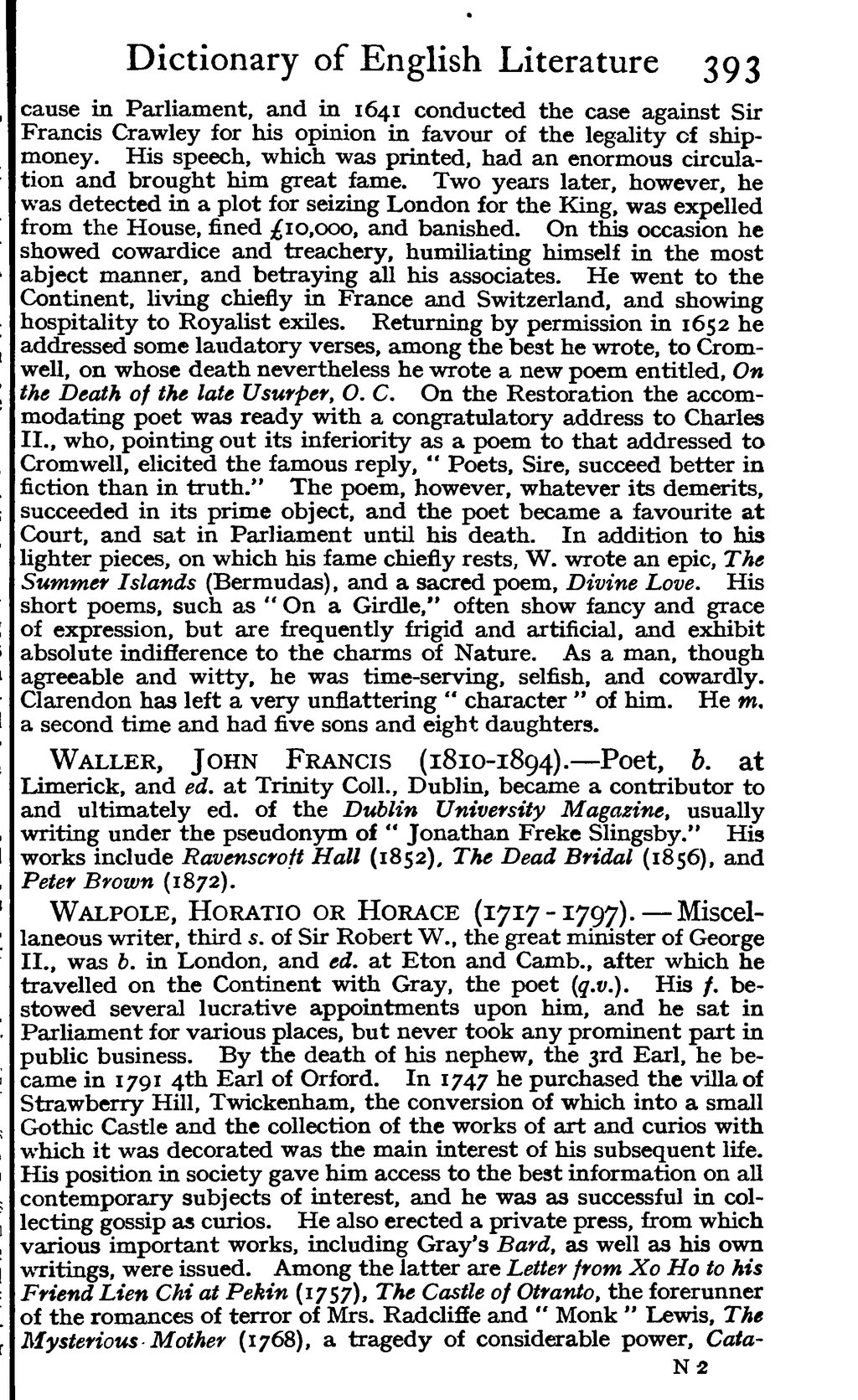cause in Parliament, and in 1641 conducted the case against Sir Francis Crawley for his opinion in favour of the legality of ship-money. His speech, which was printed, had an enormous circulation and brought him great fame. Two years later, however, he was detected in a plot for seizing London for the King, was expelled from the House, fined £10,000, and banished. On this occasion he showed cowardice and treachery, humiliating himself in the most abject manner, and betraying all his associates. He went to the Continent, living chiefly in France and Switzerland, and showing hospitality to Royalist exiles. Returning by permission in 1652 he addressed some laudatory verses, among the best he wrote, to Cromwell, on whose death nevertheless he wrote a new poem entitled, On the Death of the late Usurper, O.C. On the Restoration the accommodating poet was ready with a congratulatory address to Charles II., who, pointing out its inferiority as a poem to that addressed to Cromwell, elicited the famous reply, "Poets, Sire, succeed better in fiction than in truth." The poem, however, whatever its demerits, succeeded in its prime object, and the poet became a favourite at Court, and sat in Parliament until his death. In addition to his lighter pieces, on which his fame chiefly rests, W. wrote an epic, The Summer Islands (Bermudas), and a sacred poem, Divine Love. His short poems, such as "On a Girdle," often show fancy and grace of expression, but are frequently frigid and artificial, and exhibit absolute indifference to the charms of Nature. As a man, though agreeable and witty, he was time-serving, selfish, and cowardly. Clarendon has left a very unflattering "character" of him. He m. a second time and had five sons and eight daughters.
Waller, John Francis (1810-1894).—Poet, b. at Limerick, and ed. at Trinity Coll., Dublin, became a contributor to and ultimately ed. of the Dublin University Magazine, usually writing under the pseudonym of "Jonathan Freke Slingsby." His works include Ravenscroft Hall (1852), The Dead Bridal (1856), and Peter Brown (1872).
Walpole, Horatio or Horace (1717-1797).—Miscellaneous writer, third s. of Sir Robert W., the great minister of George II., was b. in London, and ed. at Eton and Camb., after which he travelled on the Continent with Gray, the poet (q.v.). His f. bestowed several lucrative appointments upon him, and he sat in Parliament for various places, but never took any prominent part in public business. By the death of his nephew, the 3rd Earl, he became in 1791 4th Earl of Orford. In 1747 he purchased the villa of Strawberry Hill, Twickenham, the conversion of which into a small Gothic Castle and the collection of the works of art and curios with which it was decorated was the main interest of his subsequent life. His position in society gave him access to the best information on all contemporary subjects of interest, and he was as successful in collecting gossip as curios. He also erected a private press, from which various important works, including Gray's Bard, as well as his own writings, were issued. Among the latter are Letter from Xo Ho to his Friend Lien Chi at Pekin (1757), The Castle of Otranto, the forerunner of the romances of terror of Mrs. Radcliffe and "Monk" Lewis, The Mysterious Mother (1768), a tragedy of considerable power, Cata-
